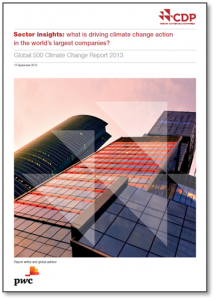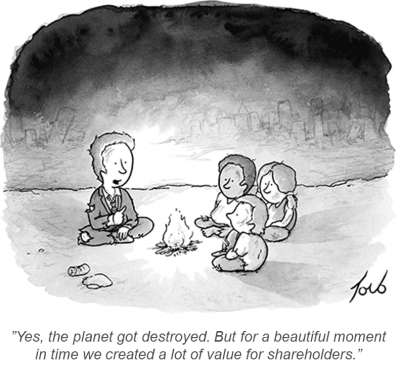
Storytelling is one thing – telling fairy-tales is another…
Humanity is currently facing the, without doubt, toughest challenge ever, stakes are extremely high. Telling fairy-tales and cheating on our next generations at such a serious moment is not what you expect…
During the last couple of weeks reports from Carbon Disclosure Project (CDP) and United Nations Global Compact have shown that there is difference between Saying and Doing – an Enormous difference!
As Jo Confino states in one of his latest articles (a must read) in the Guardian;
“…major corporations, for all their fine words on sustainability being integrated into the heart of their operations, are doing too little, too late with potential disastrous consequences…”
 Judging from the latest report from the global NGO CDP, which works on behalf of 722 institutional investors, representing $87tn ($87,000,000,000,000) in invested capital, companies don’t take climate change seriously. Companies are instead seeking to take the simplest route by measuring the easiest to reach aspects of their supply chains, even when they know they are having a negligible impact.
Judging from the latest report from the global NGO CDP, which works on behalf of 722 institutional investors, representing $87tn ($87,000,000,000,000) in invested capital, companies don’t take climate change seriously. Companies are instead seeking to take the simplest route by measuring the easiest to reach aspects of their supply chains, even when they know they are having a negligible impact.
Even worse, the 50 largest emitters, primarily in the energy, utility and materials sector have actually reported an increase of 1.65 % to 2.54 bn tonnes since 2009 (!)
A number of large well-known corporations such as Apple, Facebook and Amazon together with 94 other actually refuse to divulge data to the CDP… using all kinds of “excuses” not to do so… And this specific report only focuses on the FTSE Global 500 – what about all other corporations, the estimated 70,000 multinationals and millions of smaller enterprises…
 A similar picture as for CDP becomes quite evident when looking at the UN Global Compact “Global Corporate Sustainability Report 2013”. Out of a total 8,000 Global Compact participants only about 25% responded to the latest anonymous online survey, which makes it a bit questionable whether the findings are representative for all companies.
A similar picture as for CDP becomes quite evident when looking at the UN Global Compact “Global Corporate Sustainability Report 2013”. Out of a total 8,000 Global Compact participants only about 25% responded to the latest anonymous online survey, which makes it a bit questionable whether the findings are representative for all companies.
Although 65% (?) of the companies are committing to sustainability at the CEO level, only 35% are training managers to integrate sustainability into strategy and operations and while 83% of companies consider adherence to the Global Compact principles by suppliers, only 18% assist them and just 9% take steps to verify remediation…
Having studied both reports, it is rather disheartening to learn that the distance from “Talk-the-Talk” to “Walk-the-Talk” still is so huge and that so little actually is moving in the right direction – many of the corporations involved with these “initiatives” are then probably also to be considered as forerunners in their respective industry…
“It’s not the intention that counts – it is the action…”
Some of the figures in the already mentioned reports are astonishing – i.e. 65% of the companies that have signed the Global Compact, a set of ten quite basic principles of common sense really, have also committed to sustainability – what is the alternative; to agree on Human Rights and at the same time destroy the planet…
Disclosure is not equal to action!!
In a previous post (Link) I related to an article from the Guardian by Allen White, the Co-Founder and former CEO of the Global Reporting Initiative (GRI).
“Swamped by sustainability indicators that fail to drive transformation”
“Even if companies are taking action to reduce sustainability impacts, they may collectively overstep planetary boundaries”, warns Allen White
Amidst the blizzard of sustainability indicators populating the information marketplace, one issue looms large, complicated and unresolved. How do we know a high performing company when we see one?”
The current over 1.500 Indicators spanning almost 600 issues will by 2015 be over 2.400…
…Disclosure, after all, is a necessary but not sufficient condition for defining excellence. It is the engine that delivers data to the market. But disclosure is a means, not an end.
“Being less bad, doesn’t mean that you are Good”
– William McDonough
Sustainable Bottom Line
 If a corporations economic output is below zero we always refer to it as a loss. This loss doesn’t become a Profit until it reaches above zero – simple mathematics!
If a corporations economic output is below zero we always refer to it as a loss. This loss doesn’t become a Profit until it reaches above zero – simple mathematics!
At the same time when corporations relate to the other sustainability aspects, People and Planet, they always start where they are, and every small reduction in negative impact is then broadcasted as “More sustainable”…
Any reduction in negative impact is of course good, but I don’t understand why corporations who would never dare to replace “reduced loss” with “increased profit” unless they first pass zero – so blatantly act otherwise when dealing with other sustainability aspects…
– It is arrogance and disrespect to People and our Planet… put into continuous use…
This partly “numerical blindness” do not only betray people, it delays and postpones actions absolutely necessary if humanity is to survive on this planet…
Sustainability starts where we need to be…
Instead of starting where we are, doing small incremental changes trying to make our business and behaviour sustainable, we must start where we need to be when we have a sustainable society and work our way backwards from there.
An example – the car-industry.
Although car-makers are significantly increasing their fuel efficiency and thereby reducing emissions, their continued growth and increased sales outnumber the benefits – we will this year have an all-time-high of car sales. (Link to Report)
In reality this means that the incremental change of emissions is not at all solving the issue at hand. Instead it is obscuring the necessary action and cheating us to think that total emissions from vehicles is decreasing… while the industry is powerfully increasing the penetration of cars into as many markets as possible – major growth countries now being the developing countries. This also means that once we realize this predicament even more people are used to or even reliant of cars for their daily life… not to mention all the investments beeing made into infrastructure… the “hurdle” for change has become even higher.
 “Just look at Beijing – with air-pollution levels 40 times higher than the WHO “hazardous level” the city officials are promoting that more people should use their bikes and limiting the allowance of car-registrations – Who would like to use a bike in that smog… is this the new ‘normal’… ”
“Just look at Beijing – with air-pollution levels 40 times higher than the WHO “hazardous level” the city officials are promoting that more people should use their bikes and limiting the allowance of car-registrations – Who would like to use a bike in that smog… is this the new ‘normal’… ”
We urgently need to address this and many other issues from the other direction – in this case establishing what a sustainable transport-system look like and then develop the supply chains for such a system.
Our current approach builds on the idea that the current way of life in the “rich countries” is pretty much OK if we just “twist it a little”, something we can leave to “the market” to handle – it is time to stop cheating ourselves – a Swedish lifestyle distributed world-wide needs 3.5 Planets to support it, a US-lifestyle needs 4.5 Planets…
There is no Fairy or Sorcerer with a magic wand helping us out on this one – it’s up to us!
We are in an extremely serious situation – cheating on our next generations is simply not an option!

Source: Thinkprogress.org